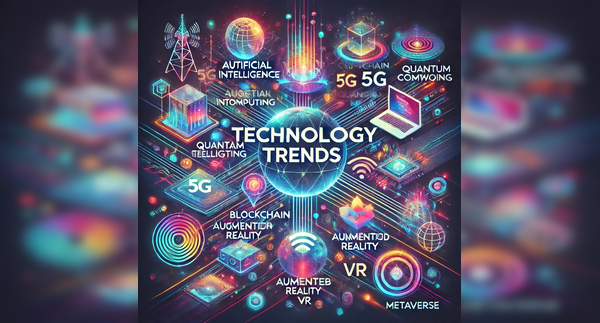
Introduction
The landscape of technology is evolving at an unprecedented pace, with innovations continually reshaping industries, economies, and everyday life. As we step into the future, several emerging technology trends are poised to define the next wave of advancements. From artificial intelligence (AI) and machine learning to quantum computing and sustainability, these trends promise to revolutionize how we work, live, and interact with the world around us.
1. Artificial Intelligence and Machine Learning
Artificial Intelligence (AI) and Machine Learning (ML) are at the forefront of technological evolution. These technologies are transforming sectors like healthcare, finance, retail, and manufacturing by enabling automation, data analysis, and predictive modeling.
AI is being integrated into everything from self-driving cars to virtual assistants, while machine learning algorithms are enhancing decision-making capabilities and optimizing operations. Industries are leveraging these technologies for everything from personalized customer experiences to supply chain optimization.
2. 5G Networks and Connectivity
5G technology is set to revolutionize connectivity, providing faster internet speeds, lower latency, and more reliable connections. With its high-speed capabilities, 5G will enable advancements in IoT (Internet of Things), autonomous vehicles, and remote working, creating new opportunities for businesses and consumers alike.
As 5G networks expand globally, they will support the growth of smart cities, connected devices, and new technologies that rely on high-bandwidth applications, such as augmented reality (AR) and virtual reality (VR).
3. Blockchain and Decentralized Finance (DeFi)
Blockchain technology, which underpins cryptocurrencies like Bitcoin and Ethereum, has extended beyond digital currencies to revolutionize sectors such as supply chain management, healthcare, and finance. Its decentralized nature offers greater transparency, security, and efficiency in transactions.
Decentralized Finance (DeFi) is one of the most significant applications of blockchain. It allows individuals to lend, borrow, and trade assets without relying on traditional financial institutions. The rise of smart contracts and decentralized applications (dApps) is redefining how we think about financial services.
4. Quantum Computing
Quantum computing is poised to revolutionize fields such as cryptography, optimization, and drug discovery. Unlike classical computers, quantum computers leverage the principles of quantum mechanics to process information in ways that were previously impossible.
Though still in its early stages, quantum computing promises to solve complex problems that are beyond the reach of even the most powerful supercomputers. As research progresses, quantum computing could lead to breakthroughs in artificial intelligence, cybersecurity, and material science.
5. Extended Reality (XR) – AR and VR
Extended Reality (XR), which encompasses Augmented Reality (AR) and Virtual Reality (VR), is transforming the way people interact with digital content. AR overlays digital information onto the real world, while VR immerses users in entirely virtual environments.
In the enterprise world, XR is used for training simulations, remote work, and design visualization. In entertainment, XR is enhancing gaming and immersive experiences. As hardware improves and content becomes more sophisticated, the adoption of AR and VR will continue to grow.
6. Sustainable Technologies
With growing concerns about climate change and environmental sustainability, many industries are turning to green technologies to reduce their carbon footprint. Innovations in renewable energy, energy storage, and sustainable materials are crucial for mitigating environmental impact.
Technologies like solar power, wind energy, and electric vehicles are helping reduce reliance on fossil fuels. Additionally, advancements in carbon capture and storage (CCS) and sustainable agriculture are contributing to a more eco-friendly future. Sustainable tech is not only beneficial for the environment but also offers long-term economic opportunities.
7. Cybersecurity Innovations
As digital transformation accelerates, so does the need for robust cybersecurity solutions. New technologies in the cybersecurity space, such as AI-driven threat detection, zero-trust architectures, and blockchain-based security, are helping organizations protect against increasingly sophisticated cyber threats.
Cybersecurity is becoming more proactive, with advanced tools that can identify vulnerabilities before they are exploited. The rise of cyber-attacks, including ransomware and data breaches, makes the implementation of these technologies more urgent than ever.
8. Autonomous Vehicles and Drones
Autonomous vehicles (AVs) and drones are set to transform transportation and logistics. AVs, including self-driving cars, trucks, and buses, promise to increase road safety, reduce traffic congestion, and improve fuel efficiency.
Drones are already revolutionizing industries such as agriculture, delivery services, and emergency response. They provide faster, more efficient ways to transport goods, monitor crops, and conduct surveys. As both AV and drone technologies mature, they will further integrate into everyday life and business operations.
9. Internet of Things (IoT)
The Internet of Things (IoT) connects everyday objects to the internet, allowing for real-time data collection and analysis. From smart homes to industrial IoT, connected devices are revolutionizing how we interact with our environment and streamline operations.
IoT applications are expanding rapidly, with smart cities, healthcare monitoring, and automated factories leading the way. The integration of IoT with AI and cloud computing is creating more intelligent systems capable of learning and adapting to changing conditions.
10. Biotechnology and Health Tech
Advancements in biotechnology are changing the way we approach healthcare, with innovations such as gene editing, personalized medicine, and telemedicine improving patient care. CRISPR technology, for example, offers the potential to cure genetic disorders, while wearable health devices provide real-time monitoring of vital signs.
The COVID-19 pandemic accelerated the adoption of telemedicine, and health tech continues to evolve, with AI-driven diagnostics, robotic surgeries, and virtual healthcare becoming more prevalent.
Conclusion
As we look to the future, these technology trends will continue to shape the world in profound ways. Whether it's through the power of AI, the connectivity of 5G, or the sustainability of green technologies, innovation is driving new possibilities for businesses and individuals. Staying informed and adaptable to these technological advancements will be key to thriving in the ever-evolving digital age.
